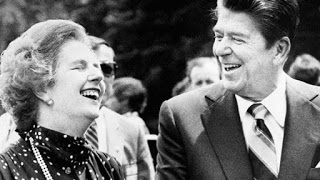Summary:
Deregulation. Infinite growth. Self-correcting markets. All are hallmarks of neoliberal thinking. But they’re more than just assumptions about the economy. They undergird much of the most influential thinking about governance right now, and dominate political and economic thinking everywhere. The results, according to some, have been disastrous. Investigative journalist Bruce Livesey asks four experts about the rise and rule of neoliberal thought, and what it may mean for societies around the world. The term “neoliberalism” is likely more used than understood. But if at its heart it’s the ideology that markets know better than humans, then its ascension into virtually every sector of society is nearly complete. At least that’s the view of economic historian, Philip Mirowski at the
Topics:
Mike Norman considers the following as important:
This could be interesting, too:
Deregulation. Infinite growth. Self-correcting markets. All are hallmarks of neoliberal thinking. But they’re more than just assumptions about the economy. They undergird much of the most influential thinking about governance right now, and dominate political and economic thinking everywhere. The results, according to some, have been disastrous. Investigative journalist Bruce Livesey asks four experts about the rise and rule of neoliberal thought, and what it may mean for societies around the world. The term “neoliberalism” is likely more used than understood. But if at its heart it’s the ideology that markets know better than humans, then its ascension into virtually every sector of society is nearly complete. At least that’s the view of economic historian, Philip Mirowski at the
Topics:
Mike Norman considers the following as important:
This could be interesting, too:
Robert Vienneau writes Austrian Capital Theory And Triple-Switching In The Corn-Tractor Model
Mike Norman writes The Accursed Tariffs — NeilW
Mike Norman writes IRS has agreed to share migrants’ tax information with ICE
Mike Norman writes Trump’s “Liberation Day”: Another PR Gag, or Global Reorientation Turning Point? — Simplicius
Deregulation. Infinite growth. Self-correcting markets. All are hallmarks of neoliberal thinking. But they’re more than just assumptions about the economy. They undergird much of the most influential thinking about governance right now, and dominate political and economic thinking everywhere. The results, according to some, have been disastrous. Investigative journalist Bruce Livesey asks four experts about the rise and rule of neoliberal thought, and what it may mean for societies around the world.
The term “neoliberalism” is likely more used than understood. But if at its heart it’s the ideology that markets know better than humans, then its ascension into virtually every sector of society is nearly complete. At least that’s the view of economic historian, Philip Mirowski at the University of Notre Dame. For him, the presidency of Donald Trump represents textbook neoliberalism: privatizing education and health care, gutting the Environmental Protection Agency (EPA) as well as health and safety, and food safety laws.

